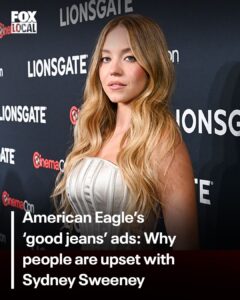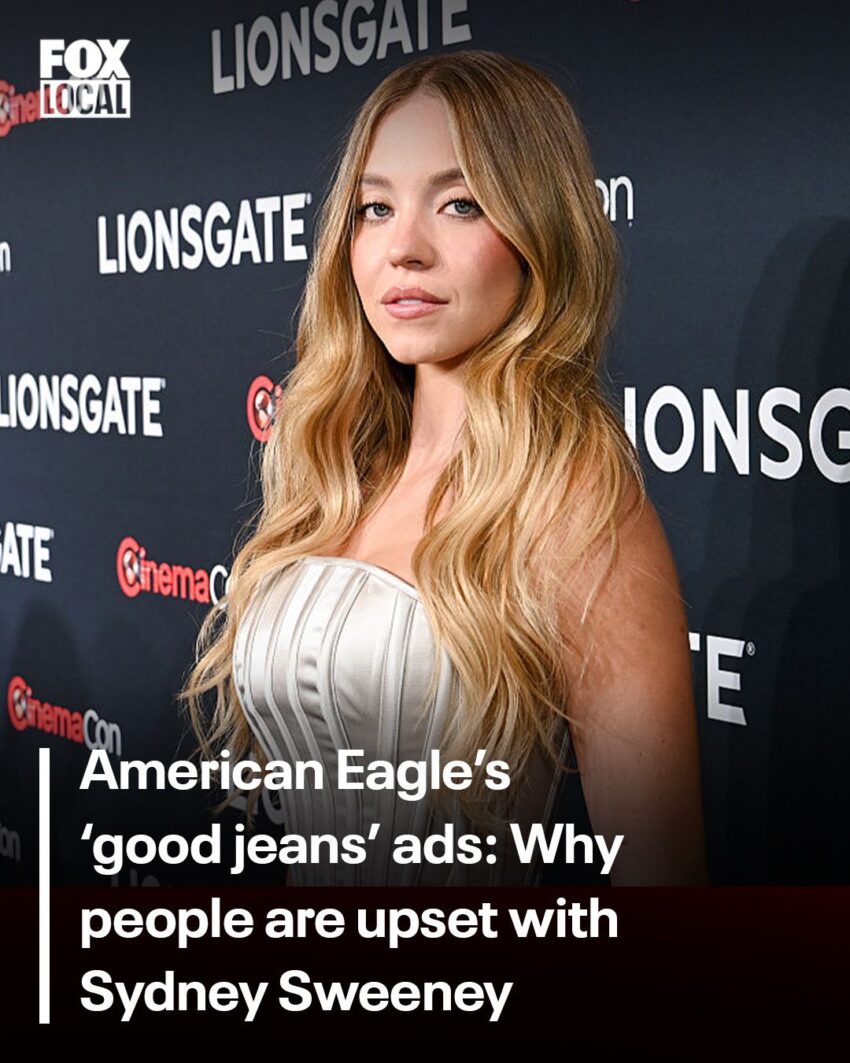FILE – Actor Sydney Sweeney attends a Lionsgate event during CinemaCon 2024 in Las Vegas. Sweeney is at the center of a cultural debate following her appearance in American Eagle’s new “great jeans” campaign. (Photo by Jon Kopaloff/Getty Images for Lionsgate)
The Brief
Sydney Sweeney stars in a fall campaign from American Eagle with the tagline “great jeans,” prompting debate over a wordplay on “genes.”
Critics say the ad evokes racial and beauty stereotypes, while others defend it as harmless branding.
American Eagle hasn’t commented publicly as the campaign continues across digital and social platforms.
LOS ANGELES – American Eagle’s newest marketing campaign was meant to be playful and bold—but it’s now at the center of an online backlash over a single word: “genes.”
The campaign, fronted by actor Sydney Sweeney, features the tagline “Sydney Sweeney has great jeans.” But a teaser video shared on social media switches the word to “genes,” sparking criticism from some viewers who say the messaging—intentional or not—reinforces outdated ideals of beauty and evokes racist undertones.
The backlash has placed the teen clothing brand in the middle of a broader conversation about cultural messaging, historical language, and what kinds of faces brands choose to represent their products.
Why is American Eagle’s campaign getting backlash?
The backstory:
The criticism centers around a short video where Sweeney says, “Genes are passed down from parents to offspring, often determining traits like hair color, personality and even eye color. My jeans are blue.” Critics pointed to her blonde hair and blue eyes as symbols of a beauty ideal often associated with whiteness—and said pairing that imagery with talk of genetics felt exclusionary, if not suggestive of eugenicist ideas.
Some viewers saw the ad as celebrating a narrow set of physical traits, with critics arguing that it subtly implied these traits were inherently superior. Others noted the historical use of the phrase “good genes” in the context of eugenics—the discredited theory of improving human populations through selective breeding—which has ties to racist ideologies, including those promoted in Nazi Germany and early 20th-century America.
Civil rights advocates and scholars have also warned that language celebrating “desirable” traits can unintentionally reinforce stereotypes and long-standing beauty standards that prioritize whiteness.
Some marketing experts say the ad’s ambiguity—and its lack of visual or cultural diversity—created space for viewers to interpret it through a more critical lens, especially given the political and cultural climate around representation in media.
What they’re saying:
Marketing professor Marcus Collins told the Associated Press that the controversy might have been avoided with a more inclusive approach. “You can either say this was ignorance, or this was laziness, or say that this is intentional,” he said. “Either one of the three aren’t good.”
Shalini Shankar, a linguistic anthropologist at Northwestern University, said the campaign feeds into a limited concept of aspirational beauty. “American Eagle, I guess, wants to rebrand itself for a particular kind of white privileged American,” she said.
The other side:
Not everyone agrees with the criticism. Megyn Kelly, a former Fox News host, tweeted, “I love how the leftist meltdown over the Sydney Sweeney ad has only resulted in a beautiful white blonde girl with blue eyes getting 1000x the exposure for her ‘good genes.’”

